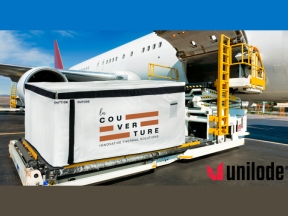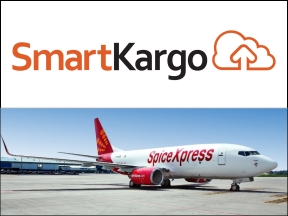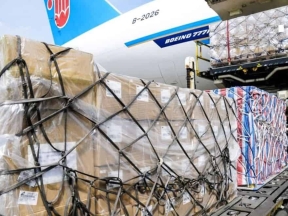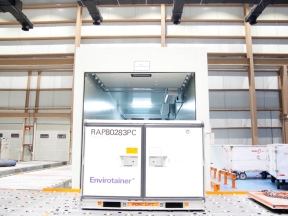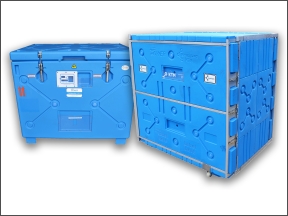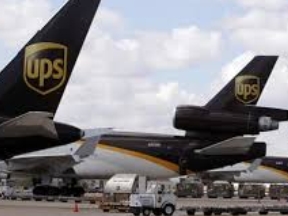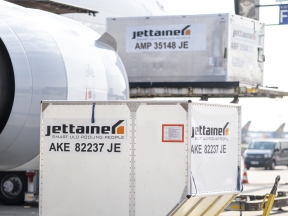Unilode Aviation Solutions and MdG Group has signed a long-term agreement for the repair of La Couverture, a unique product developed and manufactured by MdG for the protection of temperature-sensitive products in the aviation supply chain. La Couverture is a hybrid solution between a thermal cover and a temperature-controlled dolly that offers the ease of use of a cover and almost the same protection as a thermal dolly at a much lower cost and without CO2 emission. The innovative material protects temperature-sensitive cargo on a lower deck pallet during the handling phase on the tarmac between a cargo warehouse and the apron, and the product is fitted with a GPS device for location tracking. Unilode will provide extensive services for La Couverture that includes inspection, repair, storage, transport, handling and reporting within Unilode’s global repair network, initially at 17 key airports across Europe, the Middle East, North America and Asia. Marco Del Giudice, Managing Director, MdG Group, said, “As we gain market share with La Couverture, our innovative and sustainable protective solution for temperature-sensitive products, the need for extending its useful life through professional maintenance and repair services and continuing to meet IATA Pharma CEIV certification requirements has increased. Unilode’s expertise gives us confidence that La Couverture will be serviced at the highest standards at the busiest airports across the globe and our product’s three-year lifespan can be significantly increased. We look forward to a successful partnership that will further enhance the value of La Couverture and also make our expansion much easier as we can count on the services of a truly global repair network.” Marc Groenewegen, Chief Commercial Officer, Unilode, adds, “Our new agreement with MdG Group for …
Read More »SpiceJet & SmartKargo renews contract to deliver innovative air cargo technology
With an aim to continue the delivery of real-time shipment data and innovative air cargo technology that powers key operations for the carrier’s air cargo business arm, Spice Xpress, SpiceJet has renewed its contract with SmartKargo. Since 2015, SpiceJet has utilized the SmartKargo platform to support and grow its domestic and international cargo business, including its Pharma Pro cold-chain services. The airline has operated more than 12,906 cargo flights since the lockdown began and carried around 1,04,800 tonnes of cargo. Most recently, the airline has partnered with a variety of airports and logistics entitles to safely and efficiently transport Covid-19 vaccines. Sanjiv Gupta, CEO of Spice Xpress, said, “For the past 5 years, SmartKargo technology has provided Spice Xpress with the advanced digital tools needed to quickly and effectively transform our cargo business. As a result, we have been able to further digitise our processes to support highly efficient air cargo operations, growth and improved experience for our customers. We are very pleased to extend the partnership and we look forward to continuing our growth and service to our communities; especially in the critical transport and delivery of medical supplies, pharmaceuticals and vaccines due to Covid-19.” Milind Tavshikar, Chief Executive Officer of QuantumID Technologies and SmartKargo said, “SmartKargo provides airlines with real-time shipment data and tracking, paperless e-AWBs; ease of booking for Cargo agents and customers with single- screen data entries; powerful pricing and rate-making via simplification; real-time capacity management: user-configurable real-time business intelligence and reporting; integrated Cargo Revenue accounting and more.”
Read More »IATA reports 2020 as worst year for air cargo demand
The International Air Transport Association (IATA) has released the data for global airfreight markets showing that demand for air cargo decreased by 10.6% in 2020, compared to 2019. This was the largest drop in year-on-year demand since IATA started to monitor cargo performance in 1990, outpacing the 6% fall in global trade in goods. Global demand in 2020, measured in cargo tonne-kilometers (CTKs*), was 10.6% below 2019 levels (-11.8% for international operations). Global capacity, measured in available cargo tonne-kilometers (ACTKs), shrank by 23.3% in 2020 ( 24.1% for international operations) compared to 2019. This was more than double the contraction in demand. Due to the lack of available capacity, cargo load factors rose 7.7% in 2020. This contributed to increased yields and revenues, providing support to airlines and some long-haul passenger services in the face of collapsed passenger revenues. Improvements towards yearend were demonstrated in December when global demand was 0.5% below previous-year levels (-2.3% for international operations). Global capacity was 17.7% below previous-year levels ( 20.6% for international operations). That is much deeper than the contraction in demand, indicating the continuing and severe capacity crunch. With the stalling of the recovery in passenger markets, there is no end in sight for the capacity crunch. “Air cargo is surviving the crisis in better shape than the passenger side of the business. For many airlines, 2020 saw air cargo become a vital source of revenues, despite weakened demand. But with much of the passenger fleet grounded, meeting demand without belly capacity continues to be an enormous challenge. And, as countries strengthen travel restrictions in the face of new coronavirus variants, it is difficult to see improvements in passenger demand or the …
Read More »COVID-19 vaccine air transportation and handling requires open communication & collaboration, says TIACA & Pharma.Aero report
TIACA and Pharma.Aero has jointly released their second report for the global air cargo and pharmaceutical industries, outlining recommended practices and insights for effective COVID-19 vaccine air transportation and handling. The report reinforces that COVID-19 vaccines are of high value and urgent time and temperature sensitive products. As the vaccines are being transported across the globe, it is apparent that the challenge of COVID-19 vaccine global distribution demands the highest standards of Speed, Security, Reliability and Transparency. “To this end, open communication and air cargo community collaboration are paramount,” stated Nathan De Valck, Chairman of Pharma.Aero. The report details the role and recommended practices for each stakeholder in the air cargo supply chain when addressing the four major requirements identified. Both TIACA and Pharma.Aero encourage the industry to adopt a local air cargo community approach in executing these specific requirements. The project welcomed the formation of local air cargo communities in several key air cargo hubs, including some members of Sunrays’ Joint Task Force (JTF): • Brussels Airport’s BRUcure Task Force: Brussels Airport together with Air Cargo Belgium started the BRUcure task force, aiming to prepare the local cargo community stakeholders and align all resources and procedures for the correct handling of Covid-19 vaccines once they started moving through Brussels Airport. • Edmonton International Airport’s CEIV Cargo Community Ready Response: In early fall 2020, Edmonton International Airport’s CEIV cargo community and partners began preparing for the safe arrival, storage and deployment of vaccines destined for the Canadian region. • Miami International Airport’s MIAVAC19 Task Force: In anticipation of the eventual development of a COVID-19 vaccine, Miami International Airport formed the MIAVAC19 Task Force, a community partnership made up of both …
Read More »Bengaluru Airport partners with Envirotainer to offer enhanced cold-chain solutions
The temperature-controlled supply chain facility for international cargo at Kempegowda International Airport, Bengaluru (KIAB/ BLR Airport) has received a fillip with the introduction of Envirotainer, a world leader in active cold-chain solutions for air cargo. BLR Airport is now the fourth airport in the country and second in South India to partner with Envirotainer. This enables pharmaceutical companies and their logistics partners to move temperature-sensitive cargo across the world, while maintaining the integrity and quality of products throughout journey. This essentially means that temperature is maintained throughout to create an unbroken cold chain from manufacturing to the point of consumption. Backed by two dedicated cold zones, operated by Air India SATS Airport Services (AI-SATS) and Menzies Aviation Bobba Bangalore (MABB), the new cold-chain solution will boost the movement of pharmaceutical products from major manufacturing clusters such as Hyderabad, Goa, Vishakhapatnam and other places in South India. Pharmaceutical products account for 13 per cent of the total international cargo throughput from BLR Airport each year, with USA, UK, Australia, Canada, France, Vietnam, Philippines, Germany, Nigeria, Algeria, Uganda and Russia being the top destinations. AI-SATS will provide the handling and storing services for Envirotainer.
Read More »Tower partners with SpiceJet & EFL to deliver pharmaceutical & vaccines across India
TOWER Cold Chain Solutions has entered into an exclusive partnership with SpiceJet and EFL India. The alliance will apply a seamless, multi-skilled approach to pharmaceutical and vaccine deliveries across India and the sub-continent. Senthil Shanmugam, CEO, EFL Global & Managing Director, EFL India, says, “The containers we chose are obviously of the upmost importance for this expansion and operation as we need to know that they are not only reliable but they are robust and reusable. After long consideration and market analysis we chose TOWER above all others for the flexibility and reliability they bring. To have a partner we can rely on like TOWER allows us to push forward with confidence and ensure we deliver compliant vaccines and save as many people lives as possible.” SpiceJet will provide narrow and wide-bodied aircraft to carry TOWER containers and Covid-19 vaccines across India. With over 90 aircraft, SpiceJet will look at distributing across 63 domestic airports and 11 international airports to ensure the supply chain and distribution objectives are met. Sanjiv Gupta, CEO, SpiceJet Cargo, comments, “The Covid-19 pandemic has brought forth the fact that Indian cold-chain infrastructure for pharmaceutical products is rudimentary and will take time to evolve. The tripartite agreement signed between SpiceXpress, Expo-Freight and TOWER, envisages to provide the pharma companies a speedy and reliable end-to-end cold-chain logistics solution. This strategic partnership is believed to lay a strong foundation for cold-chain infrastructure not only in India, but overseas too.”
Read More »We expect universal platform for air cargo industry: Sunil Arora
Since the annual financial budget is soon to be delivered by the Finance Minister, Sunil Arora, President, Air Cargo Agents Association of India (ACAAI) shares the expectations from government. He says, “We need to be honest to ourselves and so does our government need to be truly honest towards air cargo industry. For our government, aviation means nothing else other than two A’s which are Airlines and Airports. What about agents and allied stakeholders? Industry is suffering and it’s unfortunate that pandemic has taken us back by few years. We do not expect any miracle or direct stimulus from this financial budget . The government and civil aviation Ministry in particular does not considers logistics and cargo as a significant contributor in the economic progress. We have been for years only talking to protect our National Airline, Industry desires and requests to MoCA on various fronts should be heard as priority . Logistics are intergral supporters of EXIM industry. We want government to focus on reduction of logistics cost , freight rates and operational expenses. Industry expects a much better facilitation work environment.” He continues, “A robust fully integrated comprehensive universal IT platform is required across Indian custom ports and gateways upon which our exporters, importers and supply chain managers can rely upon. We want all stakeholders to talk one language and same methodology pan India. All allied agencies are yet not on board since years. Another concern is the ever increasing cost of logistics which is a big burden. We appreciate market driven competition but not at the overnight increase in freight rates. Direct intervention and control by government is necessary and expected in this budget to slow the …
Read More »Additional taxes levied on petrol and diesel prices, leading to high cost of transportation, should be considered: Blue Dart
According to Aneel Gambhir, CFO, Blue Dart, “While the onset of the pandemic affected the logistics sector, the sector has stood the test of time by supporting the movement of essentials and non-essentials when the nation was under lockdown. We expect the government’s full support to revive the sector and in order to do so, the logistics cost should be reduced from the present 14 per cent of GDP to less than 10 per cent since high logistics cost is impacting the competitiveness of domestic goods in the international market. Investing in better road infrastructure will fasten the movement of goods, help in reducing the costs and improve turnaround time for vehicles. Improvement of air infrastructure and connectivity will help the logistics industry to boost this sector. Electric vehicles have the potential to aid in last-mile delivery while also adding to environmental protection. The Government should incentivize the use of electrical vehicles and focus on strengthening the infrastructure for enabling easy manufacturing and usage of EVs and EV-related elements. Similarly, Government could consider rolling back additional taxes levied on Petrol and diesel prices. The additional taxes levied during the pandemic are hurting the cost of transportation. It is also leading to high inflation.”
Read More »UPS enters into agreement to sell UPS Freight to TFI International
UPS (NYSE: UPS), has entered into a definitive agreement to sell UPS Freight (UPSF) to TFI International Inc. (NYSE and TSX: TFII) for $800 million, subject to working capital and other adjustments. “We’re excited about the future and the opportunities this creates for both UPS and UPS Freight as part of TFI International Inc.,” said Carol Tomé, Chief Executive Officer, UPS. “The agreement allows UPS to be even more laser-focused on the core parts of our business that drive the greatest value for our customers.” The decision to sell UPS Freight was reached following a thorough evaluation of the UPS portfolio, and aligns with the company’s ‘better not bigger’ strategic positioning. UPS and TFI International will also enter into an agreement for UPS Freight to continue to utilize UPS’ domestic package network to fulfill shipments, for a period of five years. The transaction, which is subject to customary closing conditions and regulatory approvals, is expected to close during the second quarter of 2021. UPS expects to recognize a non-cash, pre-tax impairment charge of approximately $500 million on its statement of consolidated income for the year ended December 31, 2020. Goldman Sachs & Co. LLC is serving as financial advisor, and King & Spalding LLP is serving as legal advisor to UPS.
Read More »Jettainer rolls out ‘plug & fly’ for small and mid-sized airlines
Jettainer has developed and launched ‘plug & fly’, a new basic version of its full-service ULD solution to help airlines optimise their ULD fleet by 15 per cent while making sure that the ULDs are available anywhere, at any time at transparent fixed prices. With plug & fly, small and mid-sized airlines will now be able to unlock the benefits of outsourced ULD management in a way that is quick and easy. “Big carriers are not the only ones who get to enjoy optimised ULD fleets and the smart global management services provided by Jettainer’s industry experts. Many other airlines with fleets of up to 2,000 ULDs can now reap the rewards too. To arrive at this destination, we had to take a separate, more streamlined approach that we are now rolling out with plug & fly,” said, Thomas Sonntag, Managing Director. Jettainer offers all kinds of ways to customise partnerships with airlines; from ULD management to maintenance and repair, from deploying controllers directly at the customer’s premises to many other additional services. Yet, these tailored full-service solutions do not meet the needs of each and every airline. Leveraging a wealth of possible ULD services, Jettainer has therefore developed a basic product with a fixed pricing model that is guided by the number of ULDs. These assets remain the customer’s property. By optimising the ULD fleet quantity, Jettainer generates direct and immediate cost savings for the customer. These savings come in addition to reduced costs for airlines’ own IT and coordination efforts, which are typically incurred with in house solutions. Jettainer uses an integrated IT solution harnessing artificial intelligence, ensuring real time visibility of ULDs and inventories. Jettainer’s customers also …
Read More » Cargo Breaking News
Cargo Breaking News
